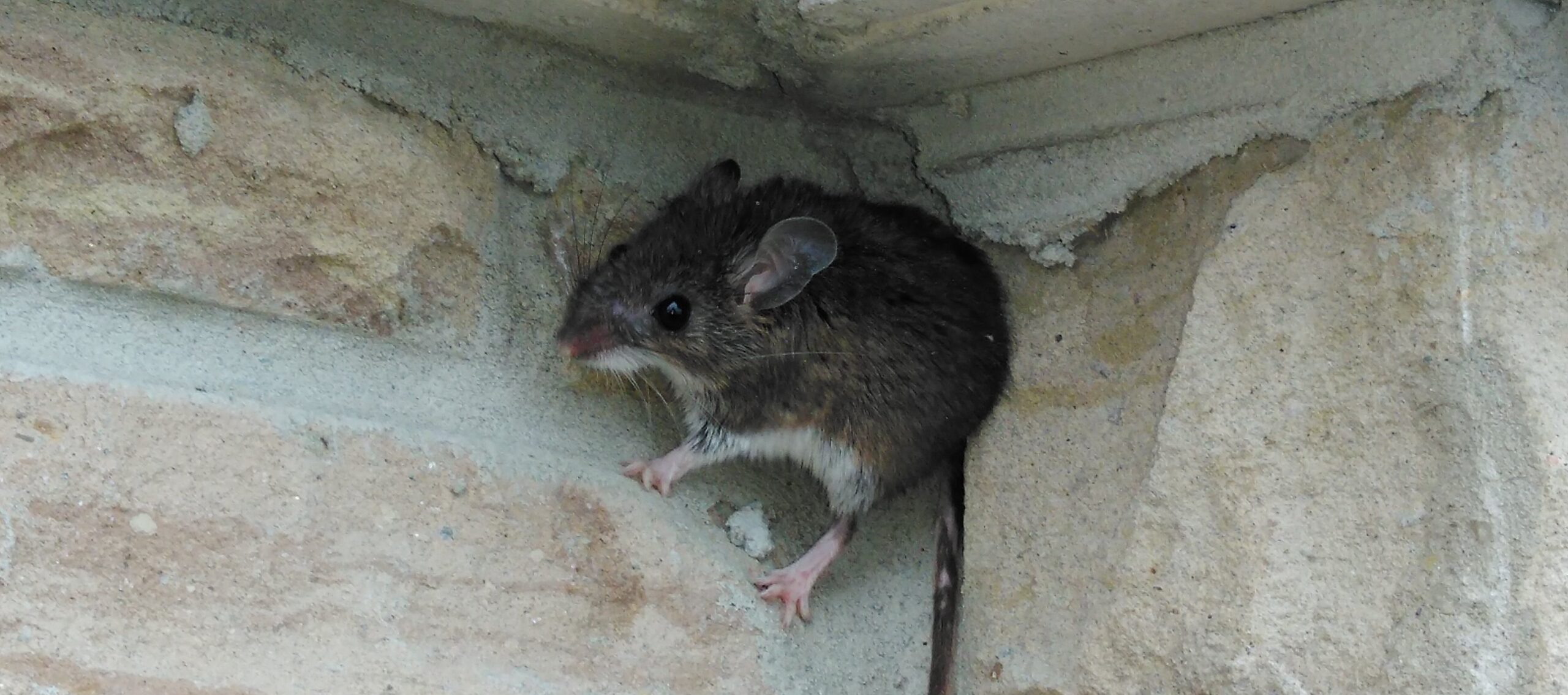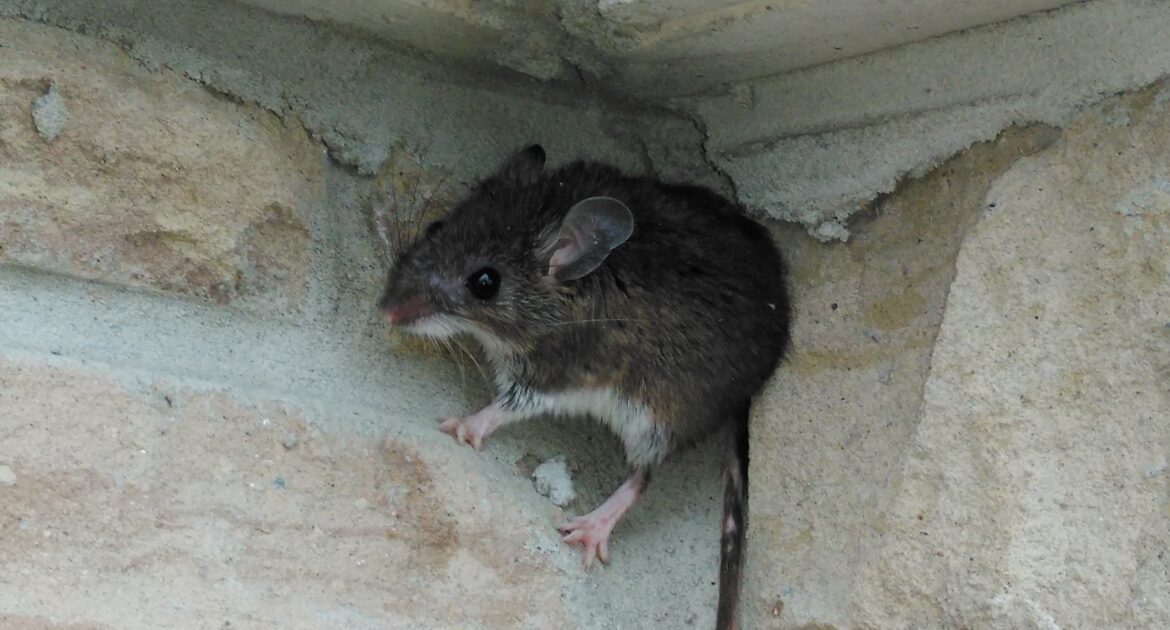Discovering mice in your basement can be a distressing experience for any homeowner. These tiny rodents can enter through the smallest openings, quickly establishing a mice infestation, which leads to health hazards and property damage. Dealing with an infestation means using professional services to help identify and humanely remove the rodents.
At Skedaddle, we understand the frustration and concern that come with discovering these unwanted guests in your home. With over 30 years of experience in wildlife removal across Canada, we’ve helped countless homeowners in Kitchener/Waterloo and beyond solve their rodent problems permanently.
Mice can maintain an alarming presence in your home if left unchecked. Their remarkable ability to squeeze through openings as small as a dime means that what starts as an occasional sighting can rapidly evolve into a significant issue. Let’s explore the comprehensive approach needed to effectively deal with mice in your basement and restore peace to your home.
Signs You Have Mice in Your Basement
Basements create the perfect environment for mice—they’re typically quiet, undisturbed, and offer plenty of hiding spots. Recognising the early warning signs of an infestation can help you address the problem before it escalates.
Visual Evidence
- Mouse droppings: Small, dark pellets about the size of rice grains, particularly along walls or near food sources.
- Gnaw marks: Visible damage on furniture, storage boxes, electrical wires, or structural elements.
- Nesting materials: Collections of shredded paper, fabric, insulation, or other soft materials often found in hidden corners.
- Tracks: Tiny footprints or tail marks in dusty areas of your basement.
Auditory and Olfactory Clues
- Scratching noises: Particularly noticeable at night when mice are most active.
- Squeaking sounds: Communication between mice, especially in established colonies.
- Musty odour: A distinctive ammonia-like smell from urine that intensifies as the infestation grows.
Early Detection Note: If you’ve spotted even one mouse in your living space, it’s almost certain there are more hiding in your walls, basement, or attic. Mice are social creatures that build networks of nests throughout homes, with most staying hidden in undisturbed areas.
Understanding Basement Mouse Behaviour
To effectively combat a mouse infestation in basement areas, it’s crucial to understand what attracts these rodents and how they operate within your home.
Why Mice Choose Your Basement
- Shelter and Safety: Basements provide protection from predators and harsh weather.
- Access to Resources: Proximity to food storage, water sources (like condensation or minor leaks), and nesting materials.
- Limited Human Activity: Less foot traffic means fewer disturbances for the mice.
The Basement-to-Home Invasion Path
Mice rarely limit themselves to the basement; once established downstairs, they use your home’s infrastructure to travel throughout the building. Wall cavities serve as hidden highways, while plumbing and electrical conduits provide convenient pathways. They also take advantage of structural gaps around joists, beams, and under flooring, turning these spaces into thoroughfares that allow them to spread quickly and quietly through your home.
Reproduction Reality: Female mice can produce a new litter every 21 days, with each litter containing 5–12 pups. This exponential growth means prompt action is essential when dealing with an infestation.
Health Risks of Basement Mice
A mice infestation presents significant health concerns that extend beyond mere nuisance.
Disease Transmission
Mice can carry and transmit several serious diseases through their droppings, urine, saliva, and parasites:
- Hantavirus: Can cause serious respiratory disease.
- Salmonellosis: Bacterial infection causing symptoms of food poisoning.
- Leptospirosis: Bacterial infection that can lead to liver and kidney damage.
Allergy and Asthma Triggers
Proteins in mice droppings and urine act as powerful allergens, especially concerning for:
- Children with developing immune systems.
- Elderly individuals with weakened resistance.
- Anyone with pre-existing respiratory conditions.
Contamination Concerns
Contaminated food storage is a major issue, as mice can taint up to ten times more food than they consume. Moreover, urine trails and droppings on counters, furniture, and stored items create additional health risks. Mice travel between unsanitary areas, such as sewers, and your living spaces, spreading potential contaminants.
How to Get Rid of Mice in Your Basement
When tackling a mice infestation in basement areas, a systematic approach yields the best results. Here’s how to address the problem effectively:
Immediate Response Steps
- Conduct a Thorough Inspection: Check dark corners, behind storage, along walls, and near potential entry points.
- Identify All Entry Points: Remember, mice can squeeze through holes as small as a dime.
- Remove Food Sources: Store all basement items in sealed plastic containers rather than cardboard boxes.
- Reduce Clutter: Eliminate hiding spots and nesting materials by organising basement storage.
Professional Mouse-Proofing: The Permanent Solution
At Skedaddle, our comprehensive approach to mouse removal involves:
- Thorough Property Assessment: Our wildlife technicians examine your home from foundation to roof, identifying potential entry points that mice might use.
- Custom Exclusion Plan: Based on your specific circumstances, we develop a tailored strategy to seal entry points using heavy-gauge steel screening and our exclusive wildlife exclusion sealant.
- Humane Removal: Rather than using lethal traps or poisons that can leave mice dying in inaccessible areas, we install one-way doors that allow mice to exit while preventing re-entry.
- Decontamination: We clean and sanitise affected areas, removing hazardous droppings and soiled materials that pose serious health risks.
Why DIY Mouse Control Often Falls Short
Many homeowners initially attempt to handle mouse problems themselves, only to discover that the infestation persists or returns. Here’s why DIY approaches typically don’t provide permanent solutions:
Limitations of Common DIY Methods
Traditional Traps:
- Only capture the mice you can see.
- Fail to prevent new mice from entering.
- Require continuous monitoring and resetting.
Poison Baits:
- Pose a risk of secondary poisoning for pets and wildlife.
- Can lead to mice dying in inaccessible areas, causing odours and attracting insects.
- Don’t address entry points or the root cause of the infestation.
The Value of Professional Intervention
The value of professional intervention lies in its comprehensive approach, as wildlife technicians address the entire problem rather than just the symptoms. With specialized knowledge of mouse behavior and building construction, they can identify hidden entry points that might otherwise go unnoticed. Their expertise ensures long-term results, as proper exclusion work prevents future infestations, ultimately saving homeowners both time and money.
Basement Mice Control Tips: Prevention Strategies
Once your home is mouse-free, maintaining that status requires ongoing vigilance. These preventative measures will help keep mice from returning:
Exterior Maintenance
Regular inspections are key. Check foundation walls for new cracks or gaps seasonally. Landscaping management is also crucial; keep vegetation trimmed away from your foundation to reduce shelter opportunities for mice. Proper garbage handling with rodent-proof containers fitted with tight lids is essential to deter these rodents.
Interior Practices
- Food Storage: Keep all food in airtight containers made of glass or heavy plastic.
- Regular Cleaning: Vacuum and sweep frequently to eliminate crumbs.
- Moisture Control: Fix any leaks and use dehumidifiers in damp basements.
Seasonal Awareness: Mice infestations often increase in fall and winter as outdoor temperatures drop and rodents seek shelter. Be especially vigilant during these transitional seasons.
The Professional Advantage: Skedaddle’s Approach to Mouse Control
When dealing with mice in your basement, professional intervention offers significant advantages over DIY methods. At Skedaddle Kitchener, our approach is built on decades of experience, ensuring effective and lasting solutions to rodent problems.
If mice in your basement are causing concern, don’t delay in seeking professional assistance. Contact Skedaddle today for thorough and humane mouse control that restores the safety and comfort of your home.




